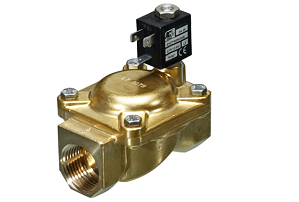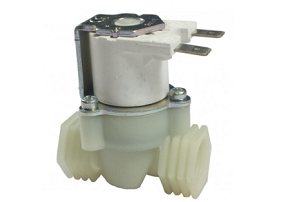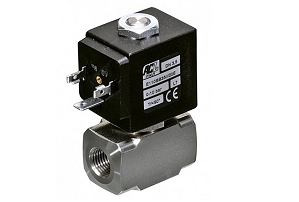By Beta Valve on Thu 09 May 2019 in Miscellaneous
There are a variety of solenoid valves used within the water treatment industry including valves of plastic, brass and stainless steel construction. They may be used for applications such as tank filling, as service valves on water softeners, piloting larger actuated valves with air or water as well as a variety of inlet valves for equipment. The choice of material depends upon the requirements of the application and its operating environment. Whilst all three valve body materials are suitable for mains water use some consideration must be given to the application parameters such as the ambient temperature, the degree of exposure to shock or other physical impacts.
The most commonly used valves are 2/2 normally closed and 2/2 normally open. The operation of these valves is either as a direct acting, where the force to operate the valve depends entirely on the magnetic field generated by the solenoid coil, assisted lift or servo assisted, where the pressure difference between the inlet and outlet of the valve is used to move a flexible diaphragm. With the range of applications within the water treatment industry as you can expect there are a huge range of connections available in both BSP and JG connections too.
Although there are several seal types offered by valve manufactures by far the most popular for use within water applications are NBR and EPDM. Versions of both materials approved to BS6920 (?) for potable water use are widely available, Standard NBR is widely used within general industrial water applications, however EPDM tends to be preferred for use in drinking/potable water applications due to the perceived absence of taint in the taste in the water. Another consideration for the seal type is temperature. Whilst NBR seals fine for temperatures of up to 60°C or even 80°C, EPDM seals are able to withstand temperatures of up to 150°C. N.B. If higher temperatures are required we would advise using a valve specifically designed for steam valves.
Mains water is generally supplied to domestic consumers at between 2 to 4 bar however in some areas where the pressures are pumped this can exceed 10 bar. All WRAS approved solenoid valves rated for 10 bar should be completely up to dealing with this, but if the application is likely to regularly expose the valve to hydraulic shock, generated by other nearby valves in the network closing quickly, then a brass solenoid valve might prove more durable.
It is best to check the required flow for the application against the flow rate of the selected valve, this can either be calculated using the KV (flow coefficient) or read directly from the flow rate curves published in the manufacturers’ data sheets. If the selected valves flow rate is too low this may starve the equipment of water.
On the other hand if the valve selected in significantly oversized, apart from incurring unnecessary cost, this can cause technical issues. In the case of servo assisted valves, there is a likely hood of finding you have a very annoying chattering noise when the valve is powered to open. This is caused because the servo assisted solenoid valve needs a pressure difference between the inlet and the outlet of the valve to operate. If the valve is too large when the valve is fully open the pressure difference may be inadequate to hold the flexible diaphragm open, so the valve abruptly closes. The moment the valve closes in this way the pressure difference is restored causing the valve to open again, which again causes the differential pressure across the valve to collapse and the diaphragm to close. The valve will continue to cycle through this process of opening and closing until it is switched off or the water demand stops.
The quality of the water passing through the valve also needs to be considered. In a hard water area the heat generated by a solenoid coil that is energised for a long period may cause calcium and lime scale to build-up inside a solenoid valves armature tube to the extent that the armature is unable to move correctly. In the case of a.c. solenoid valves this can result in the solenoid coil failing catastrophically as the coil is held in its inrush current. The use of d.c operation will avoid such spectacular failures, latching valves avoid the coil temperature rise because the coil is only energised momentarily when the valve is required to change state (open to closed or closed to open). It is also possible that lime scale can also prevent almost an valve from closing correctly as lime scale comes between the seal and the valve seat.
There are 2 solutions to this issue.
- Use a valve that has been designed to be resistant to lime scale build-up, however over time the lime scale will still build up and require periodic maintenance to prevent problem.
- Fit a water softener. This removes the lime scale from the water thus negating any build-up within the valve or the rest of the system.
The addition of corrosive cleaning chemicals to the water, as is found regularly in the case of food and chemical processing systems may make brass and plastic valves unsuitable. This is where stainless steel valves come into their own as the body material is compatible with a wider range of chemicals. Stainless steel valves also find extensive use in pure water systems.
Our brass solenoid valves are used widely in applications such as water softening, filtration systems, gravity fed systems, high pressure systems, tank refilling systems, for general mains water On/Off control and many more.
These valves are available as normally closed, normally open and servo assisted in a wide range of sizes and voltages..

Our plastic solenoid valves are available in WRAS approved versions for use in drinking/potable water applications. we also have a range of plastic solenoid valves that have been designed with household appliances such as dishwashers and washing machines. These are available as single, double, triple or quadruple valves.
These valves are available as normally closed or normally open and are available in a wide range of voltages and sizes including JG push fit connections. Latching versions also available.

Our stainless steel solenoid valves are suitable for use in more specialised applications such as RO (reverse osmosis) systems, water plant activities, demineralised water applications and applicvations where the water has a chemical/corrosive element contained within such as food processing and cleaning applications.
These valves are available as normally closed, normally open and servo assisted in a wide range of sizes.




